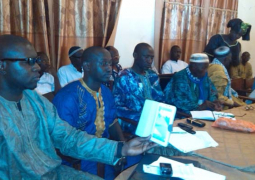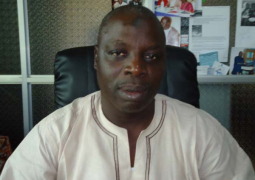The three were arraigned before Justice Emmanuel Nkea of the Special Criminal Court, charged with three counts which included conspiracy to carry out a lawful purpose by an unlawful means, giving false information to a public officer, and abuse of office, charges they denied.
In his defence, Pa Harry Jammeh told the court that he lives at Farato, and was the Solicitor General and Legal Secretary, and that he denied all the charges pressed against him.
He stated that as the Solicitor General and Legal Secretary, he was the deputy chief legal adviser to the state, and he was the one responsible for the day-to-day running of the Justice ministry and administrative matters, as well as the chief accounting officer.
Pa Harry Jammeh further told the court that he was directly answerable to the Attorney General, and that the Secretary General was equally his boss, noting that this were some of the functions of his office.
“I served in that office for two to three years,” he said.
Asked by his lawyer to take a look at exhibits D1 and E1, he said he could recall writing these letters.
He added that he had a secretary who normally typed for him and when the secretary typed, he also cross-checked it, but sometimes he was very busy.
The first letter, exhibit D1, was dated 17 January 2013, and the subject matter is the “Sate versus Amie Bensouda”, he said.
“I was given instructions by my boss to write this letter. Exhibit E1 is also “State versus Amie Bensouda”. I have noticed an error in this letter in the body of the letter and the reference number,” he added.
The letter is not connected with this case, but instead related to Amie Bensouda, and the content is about charging Joseph Wowo, and this was another executive directive signed by his boss, the former AG, Pa Harry Jammeh told the court.
“I wrote a statement to the police, Exhibit D,” he added, further stating that he did not conspire with anybody, and was not aware of any conspiracy.
“As Solicitor General, I was bound by the civil service act and rules of conduct,” he said, adducing further that his acts are govern by such rules.
He added that it was common knowledge that Wowo was his personal friend, but he had nothing personal against Wowo.
“I still do not have anything against him; that was why I was very careful,” he said.
The witness further adduced that he knew there were issues about his acting as Chief Justice, and the issue of Amie Bensouda and the arrest of several judicial officers.
“It is not correct that I have abused my office, because I have nothing to do with Wowo’s sacking. All I did was to write these two letters on the instructions given to me,” said Pa Harry Jammeh.
He also denied giving any false information to John Belford, the Judicial Secretary, stating that his membership of the Judicial Service Commission was mandated by law.
“In exhibit F11, all I did was to register my presence at the meeting, and left to attend some other urgent official matters,” he told the court.
There was nothing indicated in exhibit F11 that he said something, he continued.
“I served as a civil servant for almost 10 years, and apart from this, I have never had any issues,” he said.
He added that exhibits F1 and F2, were the statements of Joseph Wowo, and the allegation contained in these statements were unfounded.
“I was called to join the meeting which was attended by Wowo, Ozuma, Chime, Mane, and the AG. Wowo was in that meeting, but I did not say a word at that meeting because I was being careful. I never wanted anything that will jeopardize the relationship. All I did was to observe the proceedings of the meeting,” Pa Harry Jammeh went on.
“When I was summoned by the AG to attend that meeting, I said, “No”, because I never wanted a situation where I will exchange words with Wowo, because at that time the relationship has changed; but the AG insisted that I should be there,” he stated.
The 2nd accused said he denied all the allegations contained in the statement of Wowo, further stating that the Secretary General was the principal adviser to the President.
He added that once an executive directive was issued, as a civil servant he acted on it, and that it is not for him to question the validity or the authenticity of that executive directive.
He told the court that all he did was acting within his mandate.
Under cross-examination by defence counsel BS Touray, the witness stated that when he was appointed as Solicitor General, he had subscribed to an oath.
“When I was appointed as a magistrate, I subscribed to an oath and when I was called to the bar in The Gambia, I subscribed to an oath,” he stated.
The case continues on 21 October 2013, for continuation of the cross-examination.



